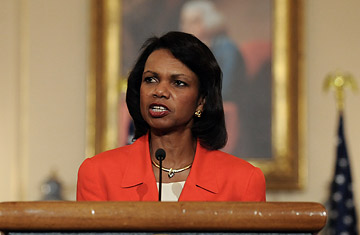
US Secretary of State Condoleezza Rice.
Over the course of the past three days, U.S. Secretary of State Condoleezza Rice has succinctly summarized the four-year arc of her Administration's diplomatic efforts to restrain Iran's nuclear program. On Friday, she told CNN that the decision to reverse four years of U.S. policy and meet with Iranian negotiators in Geneva was a one-time event, designed solely to hear Iran's response to the latest European negotiating offer. "We have one chance to receive the Iranian response," Rice said. "That's going to be on Saturday when [Under Secretary of State] Bill [Burns] receives that response."
But the Iranians didn't respond. Instead, Tehran's top negotiator, Saeed Jalili, gave the assembled diplomats only "small talk about culture" and a "meandering" speech, Rice told reporters Monday.
Washington's response? Give Iran more time. Rice and the other big-power representatives who are trying to get Iran to give up its nuclear program have set a two-week deadline for a firm answer to their latest negotiating offer. "We will see what Iran does in two weeks," Rice said Monday.
That small climbdown is the latest incremental concession by the U.S., in exchange for nothing from the Iranians. That's because the Bush Administration has found little international support for holding Iran's feet to the fire, while the combination of U.S. difficulties in Iraq and the dramatic rise in oil prices has boosted Tehran's confidence. Shortly after the U.S. invasion of Iraq in 2003, Washington rejected an Iranian offer to have broad talks in which Tehran would seek to address all U.S. concerns. But when Rice took over as Secretary of State in 2005, she agreed to support European negotiations over Iran's nuclear program. The U.S. also agreed to facilitate the sale to Iran of spare parts for airliners and to stop blocking Iranian accession talks to the World Trade Organization.
The European talks went nowhere, and six months after the U.S. concessions, the Iranians accelerated their nuclear program by starting to enrich uranium. On the last day of May 2006, under pressure from European allies to open talks with Tehran, the U.S. offered to join the Europeans at the negotiating table — but only if Iran first agreed to suspend its program of uranium enrichment. And, hoping to press the Iranians to comply, Washington spent the next two years trying in vain to forge a consensus in the U.N. Security Council for meaningful sanctions. Last week, Rice announced that she had agreed to send Burns despite Iran's firm refusal to stop enriching uranium. "It's been a slow-motion capitulation since 2005," says Ray Takeyh of the Council on Foreign Relations. "There's no other way of interpreting it."
The Iranians have remained steadfast in their refusal to suspend enrichment activities, asserting that they had done so from October 2003 to August 2005 in order to allow negotiations with the Europeans to proceed but that those negotiations had gone nowhere. The election of President Mahmoud Ahmadinejad in the summer of 2005 signaled a more hard-line turn in Tehran, and Iran resumed its enrichment activities shortly thereafter, saying it would negotiate with its centrifuges spinning, not silent.
It's possible that this time Iran will make a concession of its own. The Europeans have offered to refrain from adding any new sanctions for a defined period if Tehran agrees not to expand its enrichment program during the same time frame. (The hope is that this could be a first step toward a wider agreement.) And the U.S. is dangling what it calls a "generous" new incentives package and the prospect of opening an "interest section" in Tehran that would function as a kind of lesser embassy. The U.S. has had no diplomatic relations with Tehran since the seizure of its embassy there in 1979.
Iran could buy itself months of jawboning distraction if it agreed to the latest offer. Then again, why should it? Rice says if the Iranians don't come to terms in two weeks, the U.S. will try to get a fourth round of penalties adopted at the U.N. "If they do not decide to suspend, then we will be in a situation where we have to return to the Security Council," she said Monday. But the first three rounds of U.N. sanctions have proved ineffective so far, and with oil at $130 a barrel, the mullahs have a comfortable economic buffer.
More important, the past two years have seen the U.S. rather than Tehran forced to bend its position, and Senator Barack Obama has said he'll enter unconditional negotiations with Iran if elected President. Iran's leaders may well believe that more concessions will come — even if they make none of their own.
